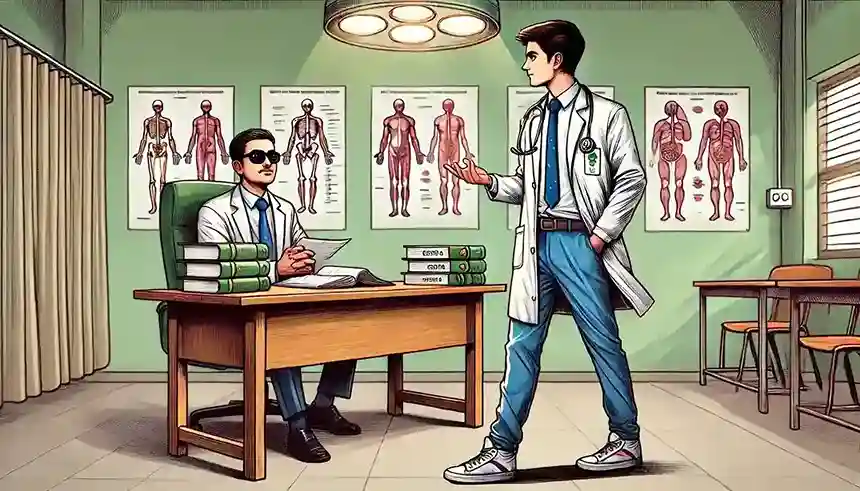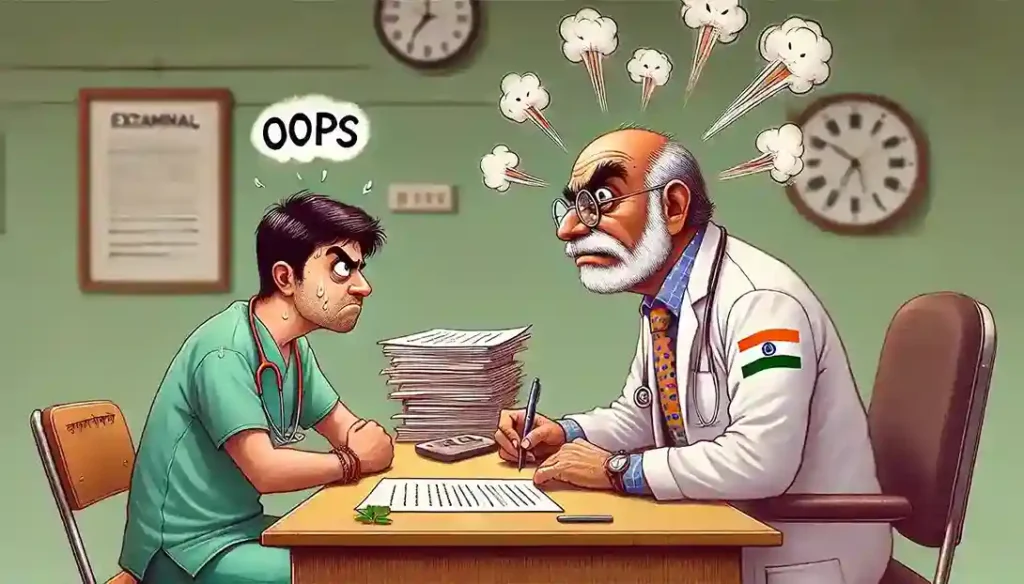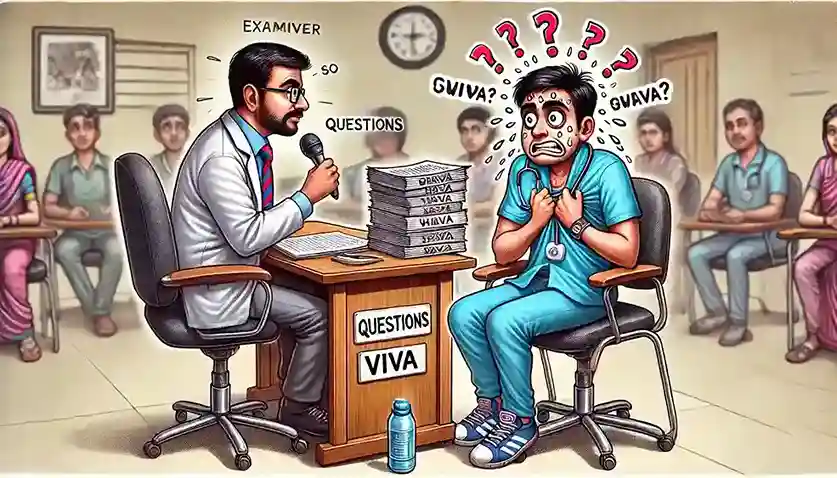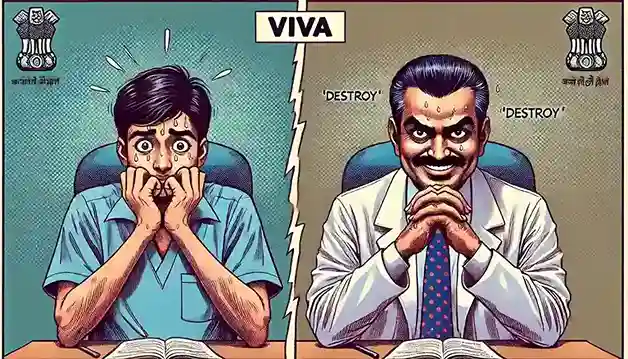The Art of Giving Good MBBS Vivas
Hello future doctors. Every MBBS student knows how scary vivas are.
You sit face-to-face with the examiner—entering the cabin is itself like entering the lion’s den. The examiner asks you if anything within the syllabus might also be from outside the syllabus. It can be a thought-out, long question or a rapid-fire session.
You will be expected to answer questions on the spot. Some examiner might expect to-the-point answers, whereas some might expect detailed explanations. There’s no way to know what the examiner expects until you start answering.
If the thought of being shouted at in a viva scares you, don’t worry. You’re not alone. We all get nervous before vivas. But, like everything else in MBBS, there is an art of giving vivas.
I asked many MBBS students and created a foolproof guide for giving vivas. Here is it:
1. Prepare the most important topics in detail.
Before we talk about strategies that you need to use on the exam day, let’s get the basics right: preparation. It gets difficult to study the entire syllabus in a day for the viva. So, I would advise you to study the important topics in great detail and just brush up on the uncommon topics.

For example, in pharmacology, you MUST know everything about Tuberculosis. Even MDR TB. Chances are the examiner will start with TB and if you are able to answer all the questions right, they will move on to another topic. If you can not answer even TB, the viva won’t go on for long.
Try to prepare by explaining the topic to your friends. Verbal practice will help you feel better at speaking your mind. Question each other, pretend to be the examiner. This will help you identify the gaps in your preparation.
While preparing, always think about the possible questions that can be framed on the content, especially the topics you know well. Which brings us to the next point…
2. Steer the viva towards a topic you know well.
One of the most well known strategies in a viva, is to try and steer the conversation towards a topic you know. When you are answering another question, just try to subtly mention a topic that you know inside-out. This increases the chance of the examiner following up with a question on that topic.

Let me give you an example: Imagine the Pathology examiner asks, “What are the types of necrosis?” You can answer:
- “There are different types of necrosis: like coagulative necrosis, caseous necrosis and fat necrosis. Fat necrosis is often associated with acute pancreatitis due to lipase activity.”
Mostly, the examiner will stop you there and start quizzing you on acute pancreatitis. And it is a topic which you’re prepared to discuss.
Just make sure that you are staying on topic, do not mention something that’s not related to the topic. And, if the examiner wants to stay on the initial topic, do not try to keep steering it away. It can backfire.
3. Show Your Thought Process
Vivas aren’t just about memorizing and then giving the right answer—it’s about showing how you think. Examiners might appreciate you for showing them your chain of thoughts instead of just sitting there blankly.

Let me give you an example. Let’s say you are asked: “What is the most common cause of splenomegaly?” and you’re not sure. You can start by thinking out loud:
- “Splenomegaly can occur in a variety of conditions. It could be due to infections like malaria, or it could be related to hematological disorders like leukemia or lymphoma.”
Along the way, the examiner will help you reach the answer. Even if they do not help, and you do not reach the answer by yourself, you’re showing the examiner that you have studied and you can approach the question logically.
This also helps fill awkward silence and often results in a better viva.
Remember, something is better than nothing.
4. Know When to Say “Sorry”
Golden rule in vivas: If you don’t know, just say sorry. Do not throw a wild guess. Nothing can cover up a gross mistake. ‘Sorry’ might land you in trouble but a gross mistake will definitely land you in trouble.

Don’t keep looking at the ceiling/ closing your eyes and pretending to recall. If you keep pretending, the examiner might keep asking questions related to that topic.
Instead, once you’ve said sorry, the examiner might shift to a different topic altogether.
Most examiners respect honesty, and will give you passing marks if it wasn’t a very important topic.
Some examiners also just want you to admit defeat. A small ‘Sorry’ goes a long way.
5. Don’t Try to Confuse the Examiner
This one is very important: Never try to confuse the examiner by going off-topic or just using complex terms if you don’t know the answer.
Examiners are very good at spotting when students are trying to pretend they know something they don’t. Such tactics might anger the examiner. They might take an even more difficult viva or worse – just ask you to leave.

The best approach is to stay calm, provide the information you know, let them see your thought process. When you get struck and feel unsure, go back to the previous point—just admit it politely and say ‘Sorry’.
6. Try to understand what the examiner wants
As I mentioned earlier, not every examiner is the same. Some expect details and some want one word answers.
By the time you have answered 2-3 questions, you will have a good understanding of the expectations. Be observant and try to deliver in the format that the examiner is asking for.
As I mentioned before, irrelevant bluffing is not going to help.
7. Calm down and be confident (not overconfident)
It’s normal to feel nervous before a viva, you can practice deep breathing exercising when you are sitting outside the examiner’s cabin.
Think of the viva as more of a conversation, similar to ones you have with your friends. The examiner wants to see your knowledge and how you apply it in real time, they do not come in with the intention of failing you.
Confidence is your best friend in a viva. It will show the examiner that you are ready and prepared for the test.
Just make sure that you are not too cocky, some examiners might take it as a challenge. Stay put but do not give a crass reply to anything.

If they shout at you, do not answer back. If they say something mildly hurtful, do not answer back. Even if they say something very rude, do not answer back. Just don’t answer back. The last thing you want is to make the examiner feel like you’re not respecting them.
So, stay polite, answer confidently and with humility.
Remember, most examiners are not there to fail you—they are simply testing how well you understand the material.
Pro tip:
Greet your examiner “Good morning/afternoon, sir/ma’am,” and always ask before sitting down. Maintain a professional attitude and make sure to be respectful at all times.
Being well dressed and well prepared can help with confidence and the first impression.
Final Thoughts: Viva Is an Art
I was a very anxious person, and almost always used to give bad vivas. But over time, I understood how to give them and started scoring more. It takes time to learn the art of giving vivas, but you will surely get there.
Vivas are not just about your knowledge, they include a lot more factors as described. Sadly, because of the medical hierarchy, most of them are not in your control.
What you can do is: Just put in a little more preparation. Use the strategies in this blog. And, remember that at the end of the day, it’s not just about knowing all the answers. It is about showing that you are prepared, capable and a logical thinker.
Good luck, future doctors! You’ve got this.






